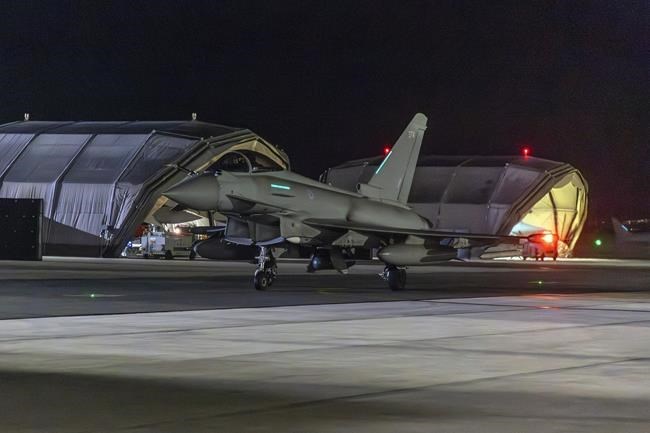OTTAWA — Canadian Armed Forces members provided planning support for the U.S.-led attack on Houthi positions in Yemen, but the Defence Department said Friday that no Canadian assets were involved.
The U.S. said they and the U.K. attacked more than 60 targets at 16 sites used by the Iran-backed group in Yemen on Thursday to demonstrate that the allies will not tolerate the group’s attacks on ships in the Red Sea.
A joint statement released by the White House said Canada, the Netherlands, Bahrain, and Australia provided support for the strikes, which the Houthis said killed at least five people and wounded six.
Three Canadian staff officers were deployed in December to the multinational operation in the Red Sea known as Operation Prosperity Guardian. They include two planners and an intelligence analyst, the Defence Department said Friday.
The department also noted that around 20 troops are deployed to a U.S. operational headquarters in Qatar, but could not immediately explain whether they were involved in the planning of the attack as well.
Prime Minister Justin Trudeau told reporters Friday it was important for Canada to be involved because the Houthis were endangering lives.
"The international community had a responsibility to step up, as laid out by UN Security Council resolutions, and we support the very targeted actions taken by military assets from the U.K. and the U.S.," he said at a press conference in Toronto.
Asked why Canada's involvement was limited to planning, Trudeau said "we don't have the particular assets in the region." A Defence Department spokesperson said in December that allies were asked to contribute ships, planes and staff but did not explain why Canada has not provided military assets to the operation.
Opposition Leader Pierre Poilievre said in a Friday press conference of his own that he agrees the strikes were necessary to counter the threat posed by the Houthis.
Poilievre said the Houthis were a proxy for the Iranian government, referring to them as a "Tehran-backed pirate outfit."
The White House said it expects there could be retaliation.
"This wasn’t some signalling exercise," National Security Council spokesman John Kirby said. "This was designed to disrupt and degrade Houthi military capabilities."
The U.S. Navy has warned American-flagged vessels to stay out of areas around Yemen in the Red Sea and the Gulf of Aden for the next 72 hours after a Houthi military spokesman, Brig. Gen. Yahya Saree, said in a recorded address that the strikes would "not go unanswered or unpunished."
The International Maritime Security Construct has issued a warning, saying ships should choose routes as far from Yemeni waters as possible, travel at night and avoid stops that make them an easier target.
The territory controlled by the Houthis in Yemen is home to around two-thirds of its 34 million people.
War began in the country after the rebel group seized the capital, Sanaa, in 2014. A Saudi-led coalition intervened to restore the exiled government to power, leading to years of proxy war as Saudi Arabia and Iran battled for control over the Arab world's poorest country.
More than 150,000 people have been killed and hundreds of thousands more have died from starvation and disease. The vast majority of the country is considered food-insecure by the World Food Program.
While permanent peace has not been achieved, Saudi Arabia reached a Chinese-mediated deal to restart relations with Iran in hopes of ultimately withdrawing from the war last March and a ceasefire has held.
The Houthis said their assaults are aimed at stopping Israel’s war on Hamas in the Gaza Strip. Their targets increasingly have little or no connection to Israel and imperil a crucial trade route linking Asia and the Middle East with Europe.
They have carried out 27 attacks involving dozens of drones and missiles since November, and on Thursday they fired an anti-ship ballistic missile, which did not hit its target.
Biden said Thursday's strikes, the first military action taken by the coalition, came after attempts at diplomatic negotiation. It also came a week after the White House and partner nations warned the Houthis to end the attacks.
The governments of Australia, Bahrain, Canada, Denmark, Germany, Netherlands, New Zealand and South Korea joined the U.S. and U.K. in issuing a statement Wednesday saying that while the aim is to de-escalate tensions and restore stability in the Red Sea, the allies won't hesitate to defend lives and protect commerce in the critical waterway.
About 12 per cent of the world’s trade typically passes through the waterway that separates Africa and the Arabian Peninsula, including oil, natural gas, grain and everything from toys to electronics.
This report by The Canadian Press was first published Jan. 12, 2024.
— With files from The Associated Press
Sarah Ritchie, The Canadian Press



